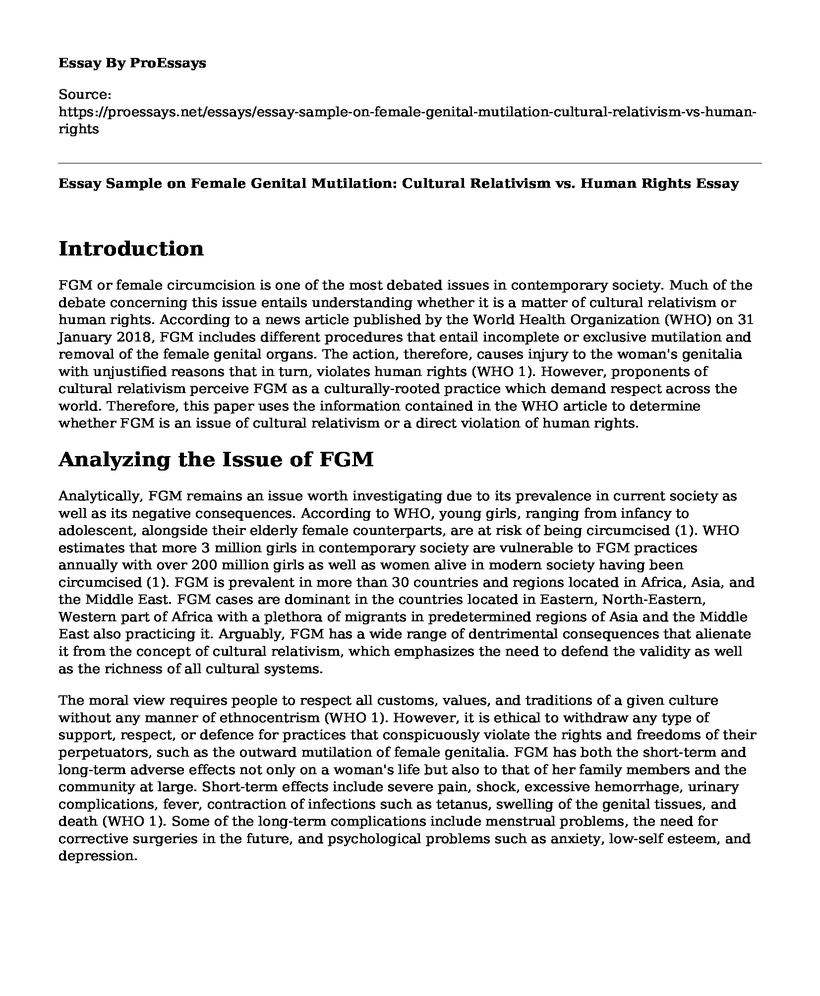Introduction
FGM or female circumcision is one of the most debated issues in contemporary society. Much of the debate concerning this issue entails understanding whether it is a matter of cultural relativism or human rights. According to a news article published by the World Health Organization (WHO) on 31 January 2018, FGM includes different procedures that entail incomplete or exclusive mutilation and removal of the female genital organs. The action, therefore, causes injury to the woman's genitalia with unjustified reasons that in turn, violates human rights (WHO 1). However, proponents of cultural relativism perceive FGM as a culturally-rooted practice which demand respect across the world. Therefore, this paper uses the information contained in the WHO article to determine whether FGM is an issue of cultural relativism or a direct violation of human rights.
Analyzing the Issue of FGM
Analytically, FGM remains an issue worth investigating due to its prevalence in current society as well as its negative consequences. According to WHO, young girls, ranging from infancy to adolescent, alongside their elderly female counterparts, are at risk of being circumcised (1). WHO estimates that more 3 million girls in contemporary society are vulnerable to FGM practices annually with over 200 million girls as well as women alive in modern society having been circumcised (1). FGM is prevalent in more than 30 countries and regions located in Africa, Asia, and the Middle East. FGM cases are dominant in the countries located in Eastern, North-Eastern, Western part of Africa with a plethora of migrants in predetermined regions of Asia and the Middle East also practicing it. Arguably, FGM has a wide range of dentrimental consequences that alienate it from the concept of cultural relativism, which emphasizes the need to defend the validity as well as the richness of all cultural systems.
The moral view requires people to respect all customs, values, and traditions of a given culture without any manner of ethnocentrism (WHO 1). However, it is ethical to withdraw any type of support, respect, or defence for practices that conspicuously violate the rights and freedoms of their perpetuators, such as the outward mutilation of female genitalia. FGM has both the short-term and long-term adverse effects not only on a woman's life but also to that of her family members and the community at large. Short-term effects include severe pain, shock, excessive hemorrhage, urinary complications, fever, contraction of infections such as tetanus, swelling of the genital tissues, and death (WHO 1). Some of the long-term complications include menstrual problems, the need for corrective surgeries in the future, and psychological problems such as anxiety, low-self esteem, and depression.
Conclusion
FGM remains one of the most controversial cultural practices in modern society. Despite the initiative to eradicate it, FGM's prevalence and incidence remain rampart in different global regions, including Asia, the Middle East, and Africa. FGM oversteps human rights and cannot necessarily appeal to the concept of cultural relativism as it entails violent practices. Therefore, there is a strong need to have joint efforts from all stakeholders to address this harmful practice.
Works Cited
The World Health Organisation. Female genital mutilation. The World Health Organisation, 31 January, 2018, https://www.who.int/en/news-room/fact-sheets/detail/female-genital-mutilation. Accessed 18 September 2019.
Cite this page
Essay Sample on Female Genital Mutilation: Cultural Relativism vs. Human Rights. (2023, Feb 13). Retrieved from https://proessays.net/essays/essay-sample-on-female-genital-mutilation-cultural-relativism-vs-human-rights
If you are the original author of this essay and no longer wish to have it published on the ProEssays website, please click below to request its removal:
- Promoting LGBT Health and Wellbeing Rhrough Inclusive Policy Development
- Biopsychosocial Intervention Paper Example
- Prejudice and Discrimination Representation in Art Paper Example
- Legalization of Same-Sex Marriage Essay Example
- Women's Access to Abortion Services - Essay Sample
- Gender Inequality and Discrimination of Lesbians Paper Example
- God's Unconditional Love: Marriage & Homosexuality in Christian Perspective - Essay Sample







